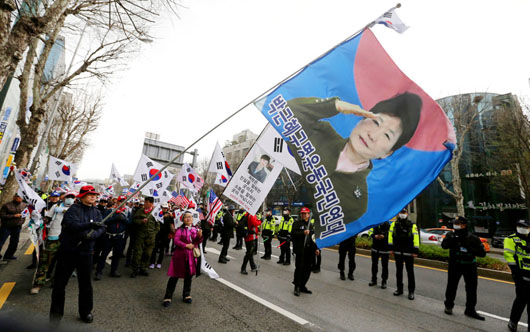by WorldTribune Staff, April 8, 2018
A panel of three judges at the Seoul Central District Court sentenced former President Park Geun-Hye to 24 years in prison and levied a $16-million fine.
The judges on April 6 found Park, 66, guilty of a dozen charges ranging from bribery to coercion, abuse of power and the leaking of state secrets. Park, like her anti-communist father — the late President Park Chung-Hee — was the target of frequent attacks from political opposition forces and North Korea sympathizers at home and abroad.

“It is a sad occasion for the country as a whole and for an individual’s life,” said Kim Eui-Kyeom, a spokesman for Park’s successor President Moon Jae-In. “Today will not be forgotten.”
Park’s defense lawyer, Kang Cheol-Gu, said the former president’s legal case hadn’t ended. “We believe that on appeal and at the Supreme Court, the correct judgment will be issued.”
Ryan Song, a law professor at Kyung Hee University in Seoul, called Park’s case a “kitchen cabinet run amok,” saying South Korea’s news media transformed a small case into a national obsession almost overnight.
“I’m wondering whether historians will look back and say that the legal and judicial institutions were swayed by the public sentiment that, again, was swayed by the media and the overall public dissatisfaction with the political affairs that were happening in Korea,” Song said according to a report by the Los Angeles Times.
“To this day, I don’t think it’s been proven that President Park has personally financially gained, in terms of bribery,” he said.
Park’s supporters have staged street demonstrations almost every week to protest against her impeachment and imprisonment and charging overwhelming bias in the nation’s mainstream media and judiciary system.
Several hundred demonstrators outside the court chanted that they did not accept the verdict of what was a “fake” trial.
“It’s a shameful ruling that betrays South Korea’s democracy,” said Park supporter Lee Jung-Kyun. “Conscience and law are dead”
Cho Won-Jin, an opposition lawmaker who has been leading pro-Park protests across the nation, called for Park’s release, saying “The judiciary under Moon’s administration, which pushed for political revenge, will be surely judged by the people and the history.”
Park has been tied closely to many of South Korea’s most historic events since the 1970s.
A pro-North Korean assassin killed her mother, Yuk Young-Soo, in 1974 with a bullet intended for her father while Park was a university student in Europe. She then returned to Seoul to serve as de facto first lady under her father, President Park Chung-Hee whose leadership ended with his own slaying in 1979 at the hands of the nation’s intelligence chief.
Park served four terms in the National Assembly between 1998 and 2012. She had sought the presidency in 2007, losing to Lee Myung-Bak, who has recently faced corruption charges.
Park won on her second try for president in 2013, defeating Moon.
The sinking of the Sewol ferry in 2014, a tragedy that killed more than 300, mostly high school students, was seen by many analysts as the beginning of the end of Park’s authority as president.
Lingering anger about the ferry sinking played a role in the political scandal that engulfed Park in late 2016 as millions of South Koreans demanded her ouster.
The National Assembly impeached her in December 2016. A constitutional court approved the decision the following March, ending her presidency and any immunity from criminal charges. Prosecutors questioned Park and then received authority to arrest her.
Subscribe to Geostrategy-Direct __________ Support Free Press Foundation
